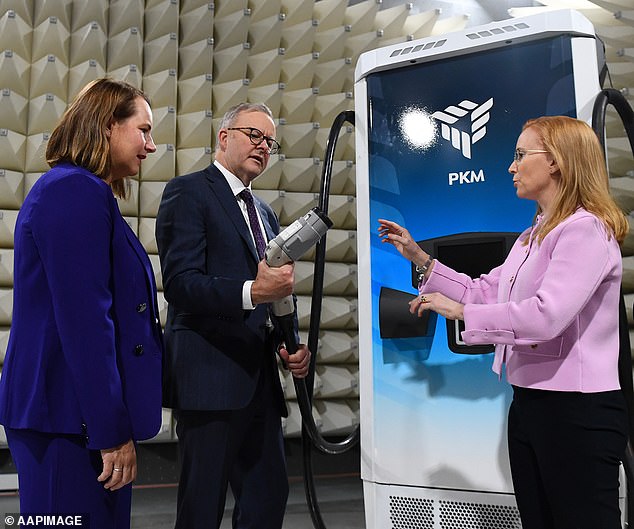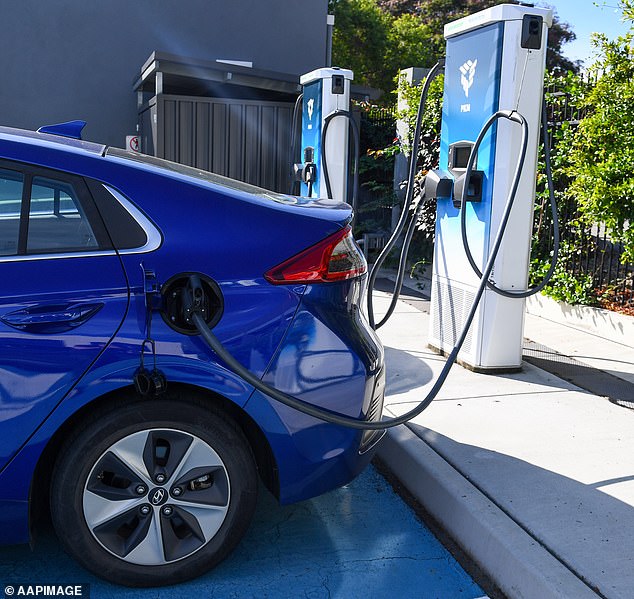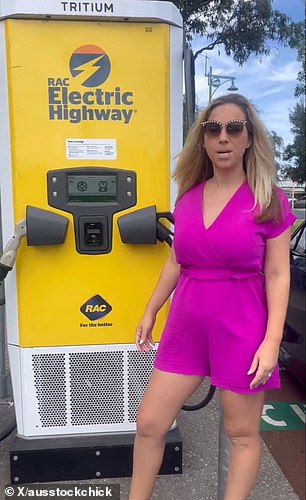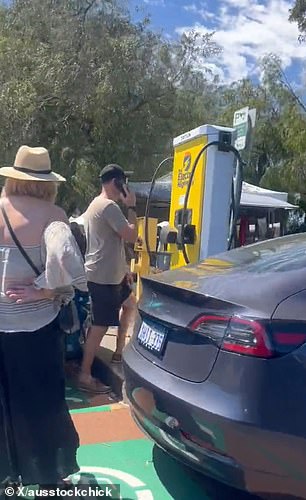How Anthony Albanese praised his poster child EV company Tritium as a ‘great success story’ – then refused to bail it out and save hundreds of Aussie jobs despite
Anthony Albanese once praised the success of EV charger company Tritium, but has refused to save hundreds of Australian jobs when it closed its Brisbane factory.
Australian-based but US-listed Tritium has confirmed it will close its Queensland factory in a desperate bid to save money after its share price plunged 98 per cent.
There are fears the company is on the brink of collapse after shareholders refused to invest more money and the share price fell from more than $10 to just 18 cents.
But just eight months ago the Prime Minister was singing the praises of the Australian start-up, founded in 2001, calling its achievements “extraordinary”.
Mr Albanese has refused to intervene with a rescue package, despite the Prime Minister being a strong supporter of electric vehicles and cutting carbon emissions.

In a blow to Prime Minister Anthony Albanese's green manufacturing ambitions, EV charging company Tritium will close its local factory due to high costs (photo, visit to Tritium in March 2023)

The company will move all of its production to its base in Tennessee, United States
During a visit to the Tritium factory in March, Mr Albanese said: 'This company has grown in a very short time and operates in 42 different countries.
'This is my third visit to Tritium. Every time I return I hear about more income, more jobs being created and more countries Australia is exporting to.
“This is a great success story here… and the capacity they have to continue to grow is just extraordinary.”
Tritium produces fast DC chargers for third-party companies such as BP and Shell, which charge electric vehicles over long distances at highway charging stations.
Critics claim the company's chargers are often unreliable and ill-suited to Australia's harsh weather conditions, often causing drivers to break down and become frustrated.
NASDAQ has now threatened to delist Tritium just a year after it debuted on the tech exchange, with its share price falling from $10.30 in November 2021 to just 18 cents on Monday.
When the company begged the Queensland state government for a $91 million bailout package to save the Brisbane factory, the plea was rejected by Premier Annastacia Palaszczuk.
The federal government also declined to intervene with a rescue package, despite the Prime Minister's praise earlier this year and the importance of chargers to the increased adoption of electric vehicles such as those from Tesla, MG, Polestar and BYD.
The Prime Minister's visit to Tritium came after the launch of the government's National Reconstruction Fund, which aims to rebuild Australia's industrial base.
The largest amount of $15 billion will provide loans, guarantees and equity to support projects that create safe, well-paying jobs and boost regional development.
But an application from Tritium for the scheme was reportedly rejected and failed to secure new funding to secure the future of their factory.
Industry Minister Ed Husic said last month that no one from the company had contacted the government directly, but said a cash injection to the struggling company was unlikely.
“Investors will obviously work with the management team to determine what to do next,” he told a trading forum in London.
'In terms of approaching the government, we haven't received one yet, but I would be very reluctant to necessarily make a positive decision as there is a lot more to be worked out within that company.'
Investors have previously attacked Tritium's decision to manufacture in Australia, where labor and energy costs are much higher than in China or elsewhere.
Australian billionaire Brian Flannery – who owns five percent of Tritium – vowed not to invest another cent in the company following the decision to start production in Brisbane.
He said the company will have to “work hard” to reduce costs and “may have to pause research and development for a while.”
He said Tritium could never make a profit from manufacturing in Australia because labor and material costs were too high.
“Production costs are generally lower in the U.S.,” he said. “They should have taken the plunge and moved to the United States sooner.”


Critics claim the company's chargers are often unreliable and ill-suited to Australia's harsh weather conditions, often breaking down and frustrating drivers (left and right)
Tritium has now spent $40 million this year to quickly build a new US factory in Lebanon, Tennessee, which will take over Brisbane production when the Murrarie plant closes on December 22.
Tritium insists only 75 workers will lose their jobs when the factory closes over Christmas, but industry experts estimate the final total at 200 of the 400 Australian-based workers.
Analysts predict that the entire Tritium headquarters will be moved to the US in the wake of the factory closure in a bid to boost investment confidence.
But CEO Jane Hunter emphasized that the remaining 200 head office jobs – including the testing and research and development teams – will remain based in Brisbane.
“This transition is in line with the company's plan to achieve profitability by 2024,” she said.
“The implementation of this plan, including the closure of the Brisbane plant and the consolidation of our manufacturing operations in Tennessee, supports the company's continued competitiveness in the marketplace and positioning as a global leader in its category.”
The state government said the closure was “disappointing” but promised to support the laid-off workers, who were told not to speak to the media about the closure.
Tritium was founded in 2001 by engineers David Finn, James Kennedy and Paul Sernia and launched on the Nasdaq two years ago with an initial valuation of $2 billion.
The current share price has reduced the company's market value to just $30 million.
